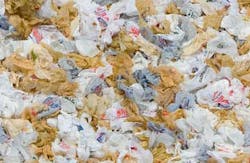More than 1 billion pounds of post-consumer plastic bags and films were collected for recycling in the United States in 2011, a new report from the American Chemistry Council (ACC) has shown.
"The National Post-Consumer Plastic Bag & Film Recycling Report," released on Monday, was based on data from 19 U.S. and three Canadian end-users of post-consumer film and 37 firms that ship consumer film overseas. The report found the the total amount of plastic bags and film collected for recycling increased by 4 percent from the previous year. Even more notably, this was a 55 percent increase from the total of 652.4 million pounds collected in 2005.
This growth can be put down to the rise in plastic and composite decking, the ACC said. Overall, deck manufacturers made up more than half of the post-consumer film that was recycled and spent money on buying 120 million more pounds of material in 2011 compared to the previous year. Film and sheet manufacturers accounted for the second-largest proportion of the total amount, with a 16 percent share and 100 million pounds.
RELATED: PET water bottle recycling rates on the rise
Similar to 2010, the majority of film collected in the United States was processed in North America — in the domestic market and in Canada — while 42 percent was exported overseas. The volume processed in the United States increased by 5 percent compared to the previous year.
Mark Murray, executive director of environmental advocacy organization Californians Against Waste, commented that the rise in recycled plastics is encouraging but the industry should aim higher than a slight growth in volume. Despite the modest increase in processing rates and the fact that more of the collected plastics and film were processed domestically rather than shipped overseas, there is still plenty of plastic film and plastic shrink-wrap which can be recycled but is collected at the back of stores and never reaches recycling facilities, he stated.
Meanwhile, data provided to Plastics News by Moore Recycling Associates Inc. of Sonoma, Calif., showed that the biggest recycling film category is made up of the so-called "commercial clear" film — clear, clean polyethylene film that includes categories like stretch wrap and poly bags. This category accounts for 47 percent of the film that was recycled in 2011 and the figure is dropping. The exact rate at which it has been falling is hard to calculate, because since this year the survey also assesses recycling rates of a new category, mixed color commercial film. According to Moore Recycling Associates, the reforms in the shipping market, including warehouse consolidation and new rules on the preparation of pallets before shipment, may have affected the commercial clear film recycling rates.
The ACC report revealed that an estimated 151 million pounds of post-consumer bags and sacks were recovered in 2011, which is 19 percent more than in 2010. However, the report warned that there was no consistent data regarding this category and figures could not be confirmed. An increase in recycling rates was recorded in other film categories, including curbside film collection, but the report pointed out that the overall amount of curbside film being used in the United States actually fell in 2011.


